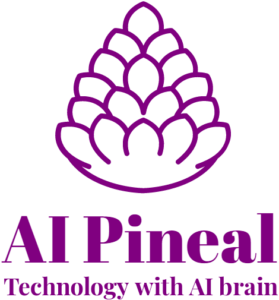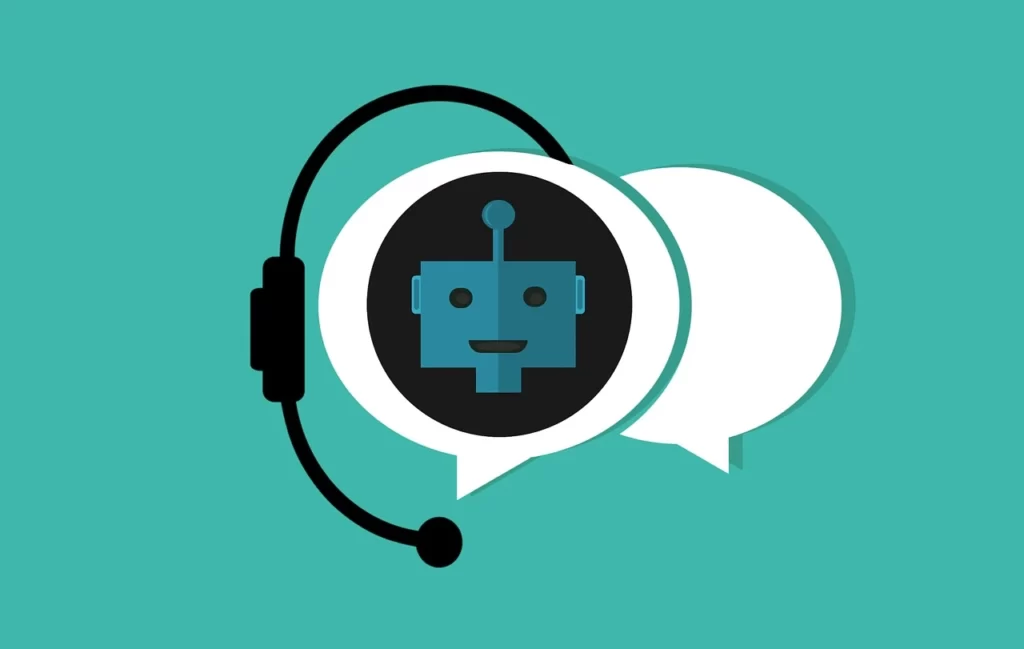Will make you explore powerful AI chatbot use cases
What are some of the AI chatbot use cases? AI chatbots benefit in various ways in business. We have all witnessed the significant change these robust tools have contributed to the commercial sector.
AI chatbots are clever, adaptable, and capable of different jobs that can assist enterprises of all sizes. AI chatbots have the potential to transform operations, expedite processes, and improve consumer experiences.
There are numerous ways for businesses to use chatbots to accomplish their goals, ranging from customer support to marketing and sales, analysis of data, company operations, and training and development for staff members.
We will look in this blog post at some of the most impactful business use cases for AI chatbots and the benefits they may provide to organizations of all sizes and industries.
Table of contents:
Highlights:
- Customer service and assistance are two of the most prevalent applications of AI chatbots in business.
- AI chatbots can personalize and customize the client experience.
- AI chatbots are utilized for lead generation to create leads for enterprises.
- The ability of AI chatbots to collect and analyze data is another significant advantage.
- AI chatbots are employed as personal assistants to aid customers and employees in more efficiently completing tasks.
- AI chatbots can engage customers and increase conversions in marketing and sales operations.
- AI chatbots are employed to improve internal corporate operations to automate administrative chores.
- Chatbots can help to give on-demand guidance and assistance to employees by answering queries and providing resources as needed.
How do chatbots operate in a nutshell?
In the past, chatbots were text-based and trained to respond to a few straightforward questions with previously written responses. But when faced with a complex topic that developers hadn’t anticipated, the chatbots would fail. They functioned like an interactive FAQ and performed admirably for the particular queries and responses on which they have trained.
More logic and Natural Language Processing (NLP) techniques have been incorporated into chatbots over time so that end users can conversationally interact with them. Modern chatbots may learn as they encounter more and more natural language since they are contextually aware.
The era of AI chatbots arrives
An AI bot is initially supplied input data, which it decodes and transforms into a pertinent output. The AI chatbot will therefore strive to provide the best possible response whenever a site user asks a question by analyzing their purpose and other aspects like tone and sentiment.
An AI bot requires a large quantity of conversational data to accomplish this. Because of this, AI chatbots must undergo training during which a developer teaches the bot how to comprehend the meaning of a person’s remarks. This comprehension enables the chatbot to respond to complicated questions that feel conversational and genuine.
Role of NLU in AI Chatbot
AI chatbots utilize a technique known as Natural language understanding (NLU) to determine the user’s needs. As per IBM, Natural language understanding (NLU) focuses on machine reading comprehension through grammar and context, enabling it to determine the intended meaning of a sentence.
They then employ cutting-edge AI algorithms to ascertain what the customer is attempting to do. These techniques rely on deep learning and machine learning, which are aspects of AI with subtle distinctions, to build an ever-more-detailed knowledge base of queries and responses based on user engagements, thereby enhancing their capacity to anticipate precisely users’ wants over time. AI bot offers a dialogue experience that gives business website users the relevant information at the right moment.
AI chatbots business use cases:
Customer Service and Assistance
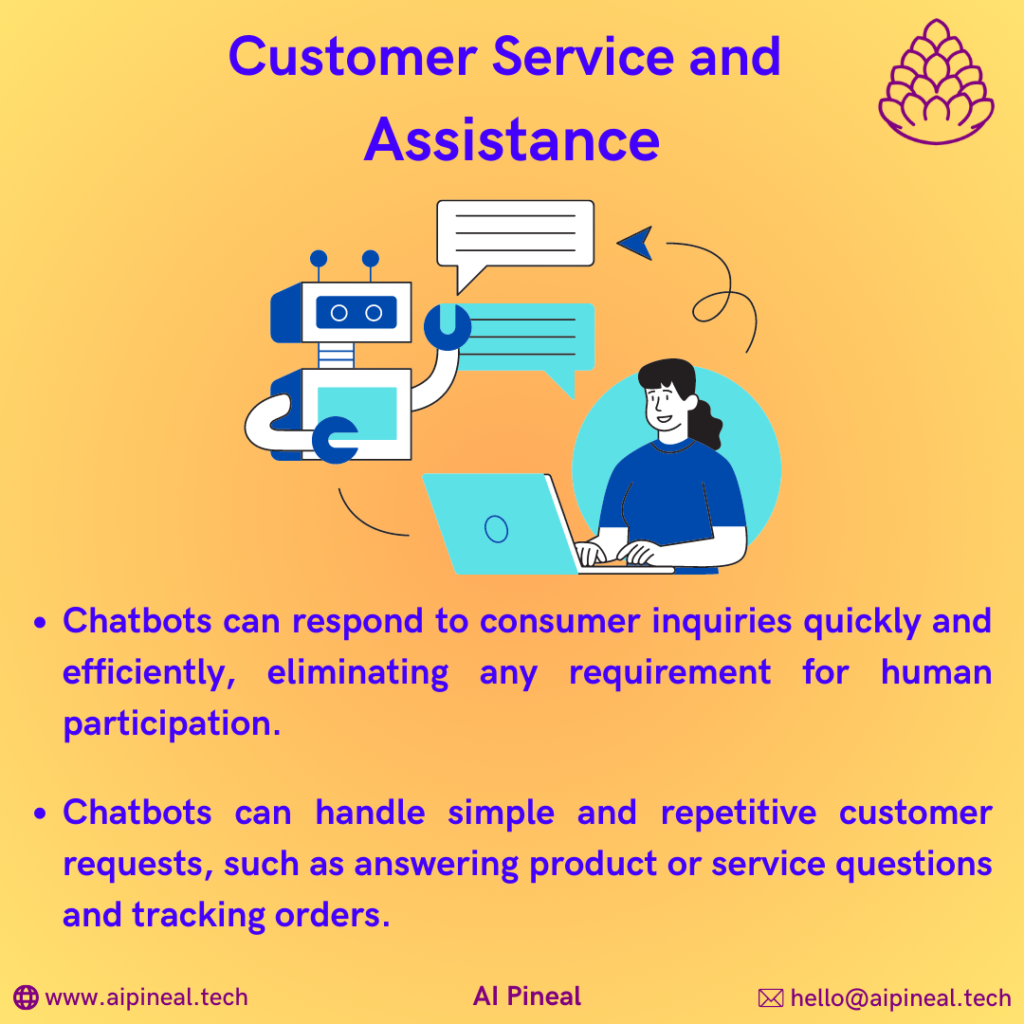
Customer service and assistance are two of the most prevalent applications of AI chatbots in business. Chatbots can respond to consumer inquiries quickly and efficiently, eliminating any requirement for human participation. These can help to cut wait times and enhance overall customer satisfaction.
Chatbots can handle simple and repetitive customer requests, such as answering product or service questions and tracking orders, as well as complex issues like troubleshooting technological faults. These additionally save organizations time and resources and help businesses boost client satisfaction and commitment by giving customers rapid access to information and support.
Customization and Personalization
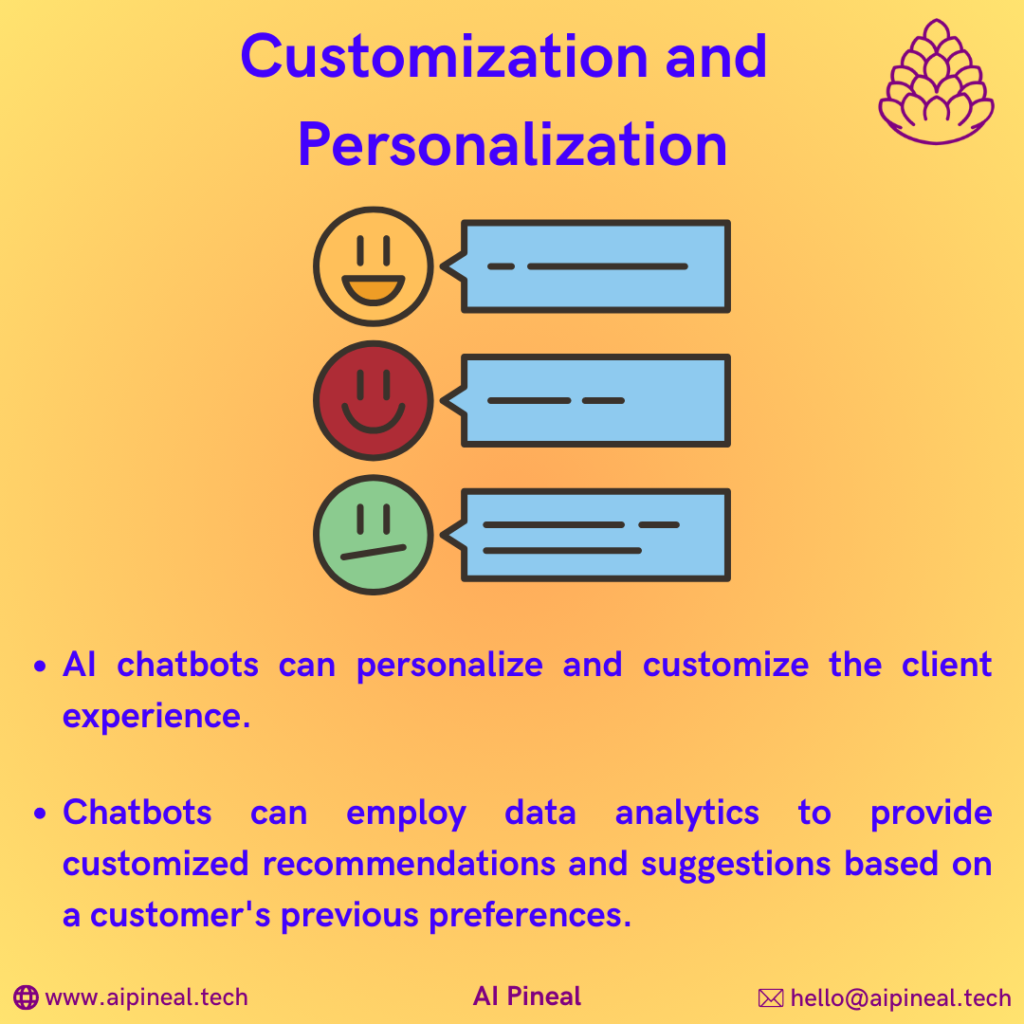
Chatbots can evaluate enormous volumes of customer data and preferences using the strength of AI algorithms to offer highly personalized recommendations and solutions. These can be especially useful in sectors like E-Commerce, where buyers frequently seek distinctive and personalized goods and services.
For instance, a chatbot that operates on a site that sells goods online can utilize machine learning and natural language processing to comprehend a customer’s interests and suggest things that are likely to interest them. Personalized product descriptions, photos, and even pricing may be included in this, depending on the customers’ previous purchasing habits and browsing habits.
Additionally, AI chatbots can offer clients proactive support and help by foreseeing their wants and promptly providing solutions. These can include easy chores like order monitoring and status updates and more difficult interactions like technical help and troubleshooting.
Businesses across industries have an exciting chance to change how they communicate with their customers and remain ahead of the competition by implementing chatbot technology.
Generation of leads
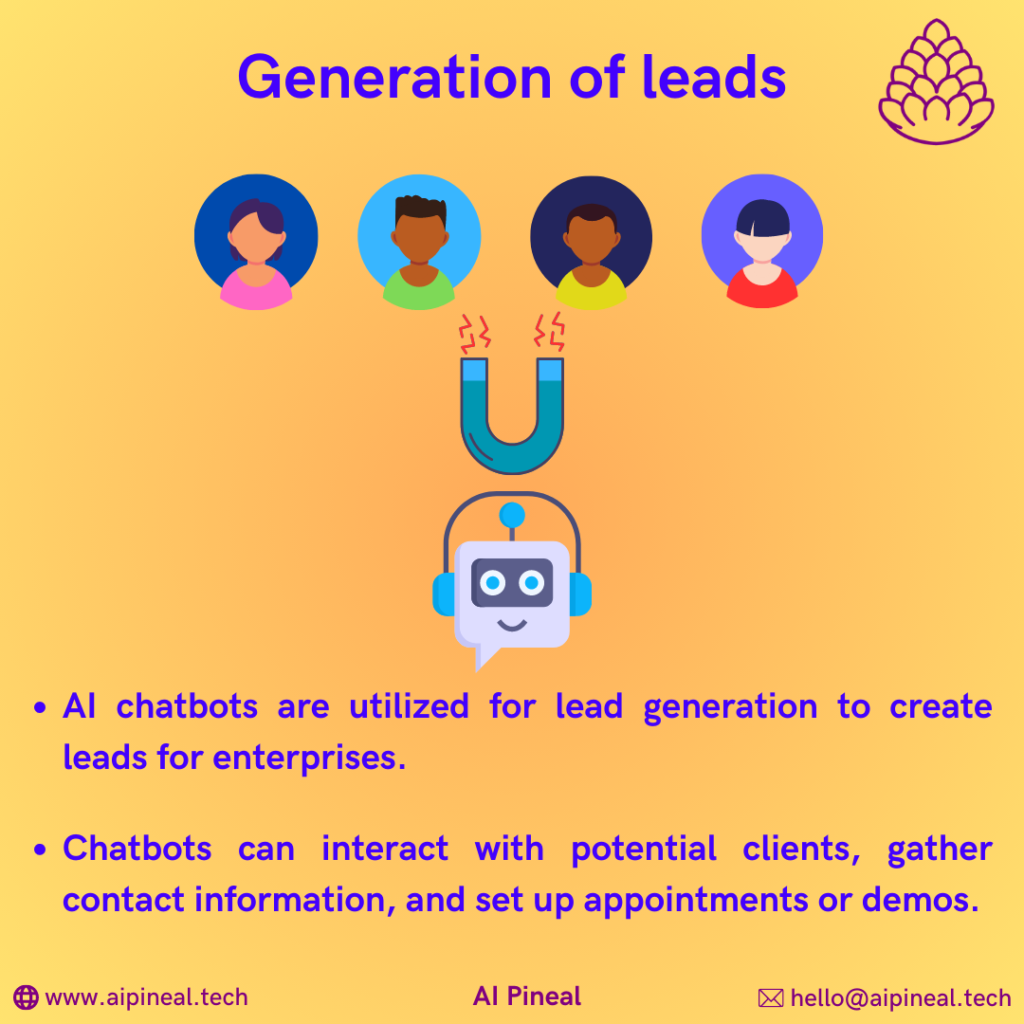
Lead generation is one of the most effective uses of chatbots since it may significantly improve a business’s capacity to draw in and convert new clients.
AI-powered bots can be developed to interact with prospective clients in a tailored and conversational way while educating them about a good or service and assisting them in the sales process. Chatbots can comprehend customers’ wants and preferences and offer specialized advice and solutions utilizing machine learning and natural language processing techniques.
For instance, a chatbot on a business website can elicit information about potential customers’ requirements and preferences through a number of questions before giving them pertinent details about the company’s goods or services. This can be done by delivering information about product features, costs, and even customer feedback in a friendly and engaging way.
Additionally, by delivering them tailored messages and incentives based on their past contacts with the business, AI chatbots can be utilized to keep up with potential clients. Nurturing leads and directing them throughout the sales pipeline can increase the likelihood that they will convert.
Overall, using AI chatbots for lead generation can significantly improve a business’s capacity to draw in and convert new clients, hence fostering revenue growth.
Data Gathering and Analysis
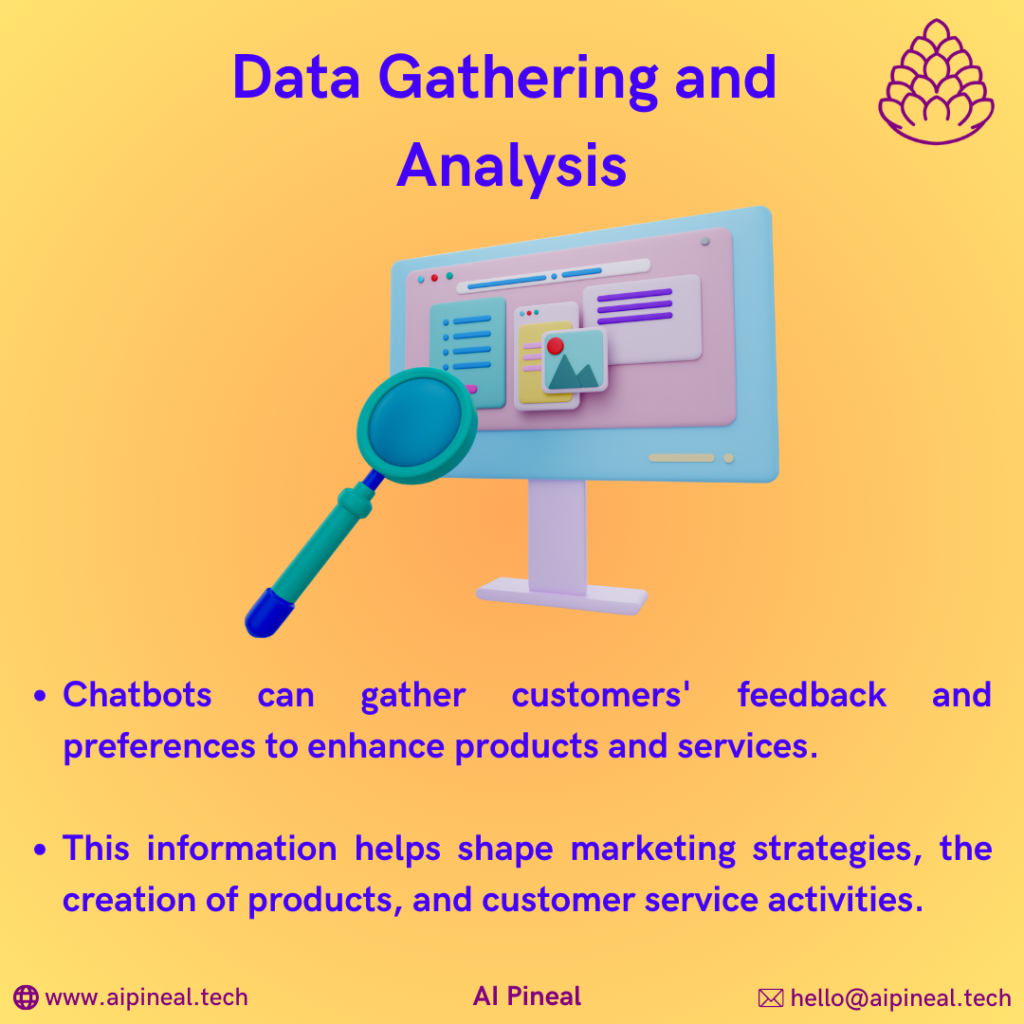
One of the many practical uses for chatbots is collecting and analyzing information, which can significantly boost a business’s capacity to comprehend its clients and enhance its goods and services.
AI chatbots can elicit useful information from users, such as preferences, criticism, and purchasing patterns. Machine learning algorithms are employed to examine this data in order to spot patterns and trends that can provide important information about the wants and preferences of the client.
For instance, a chatbot on an e-commerce website can examine client interactions to spot points where users are having trouble or becoming frustrated. The website’s customer experience may be improved with this data, making it easier for visitors to find what they are looking for.
AI chatbots can also gather and analyze customer feedback, providing companies with valuable insights into their products and services. These can include feedback on product features, pricing, and even customer service, all delivered in a conversational and engaging manner.
Virtual Personal Assistants
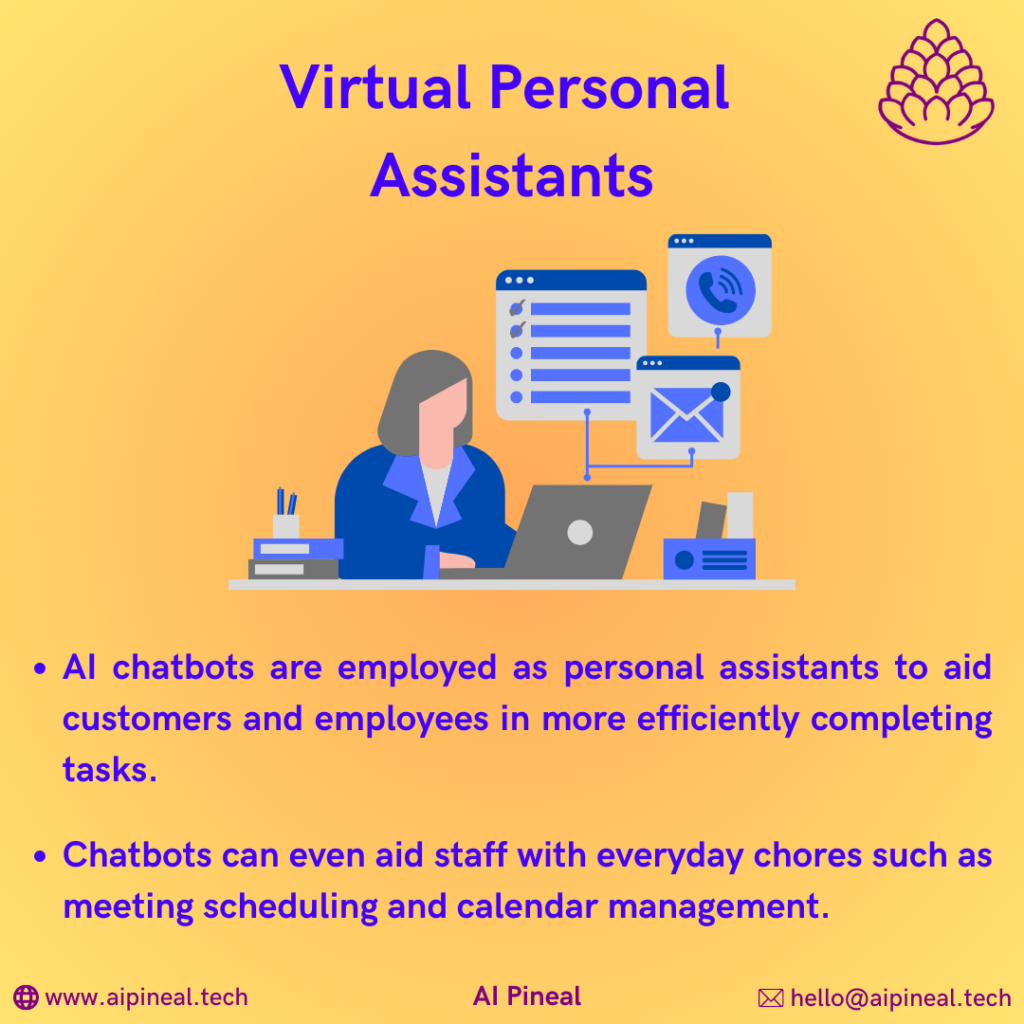
AI chatbots can be built to serve as personal assistants, giving clients and staff members useful knowledge, direction, and help. Chatbots can learn a user’s wants and preferences by analyzing spoken language and employing machine-learning techniques. They can then offer personalized recommendations and solutions.
A chatbot, for instance, can be set up to help clients with routine chores like making reservations, assessing their accounts, and even completing purchases. Chatbots can improve customer engagement and foster client loyalty by offering an individual and interactive experience.
Additionally, AI chatbots can help staff members with routine jobs like scheduling meetings, handling emails, and even conducting data analysis. Chatbots can automate these chores, giving staff more time to work on higher-value, strategic duties.
Marketing and sales
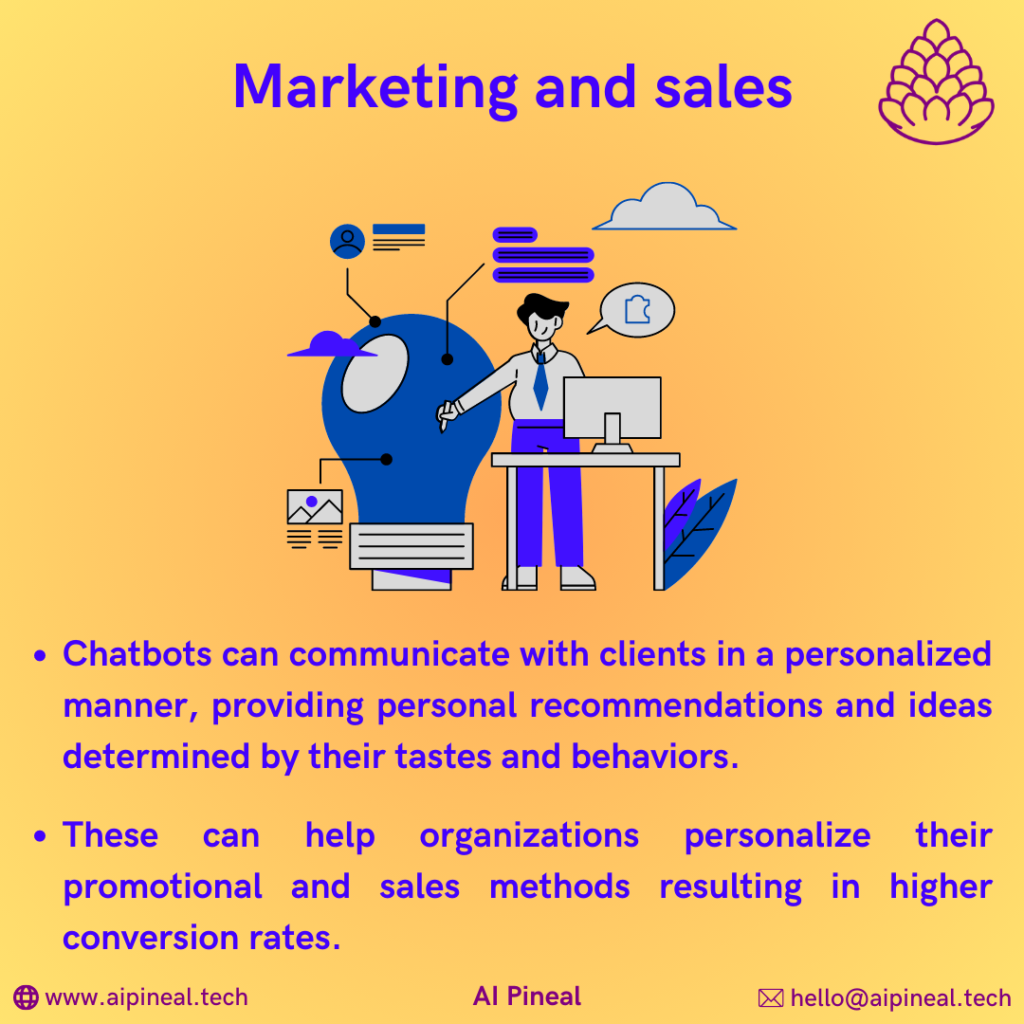
AI chatbots can engage customers and increase conversions in marketing and sales operations. Chatbots can communicate with clients in a personalized manner, providing personal recommendations and ideas determined by their tastes and behaviors. These can help organizations personalize their promotional and sales methods resulting in higher conversion rates.
Chatbots can also make product recommendations, give coupons and other offers, and even help with purchases. Businesses can save time and money by streamlining this activity while providing excellent customer service.
Chatbots can analyze data from external sources, which include social networking sites and site analytics. By integrating these findings with chatbot data, businesses can acquire a more thorough knowledge of their clients and market trends.
Employee Assistance
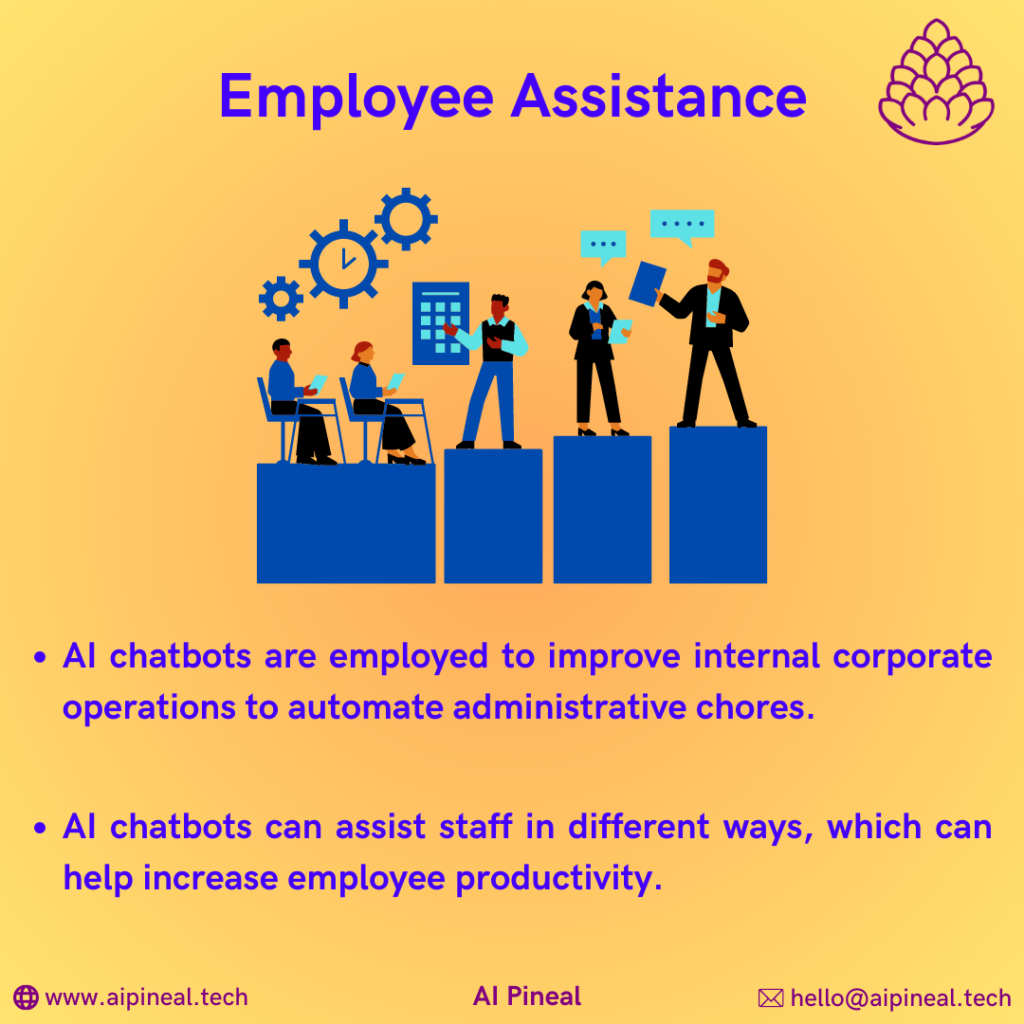
AI chatbots are employed to improve internal corporate operations to automate administrative chores such as meeting scheduling and reminders. Chatbots, for example, can answer basic HR questions and provide information about corporate rules, benefits, procedures, and other internal operations.
Internally, AI chatbots can assist staff in different ways, which can help increase employee productivity and happiness while reducing HR personnel’s workload.
Development and Training
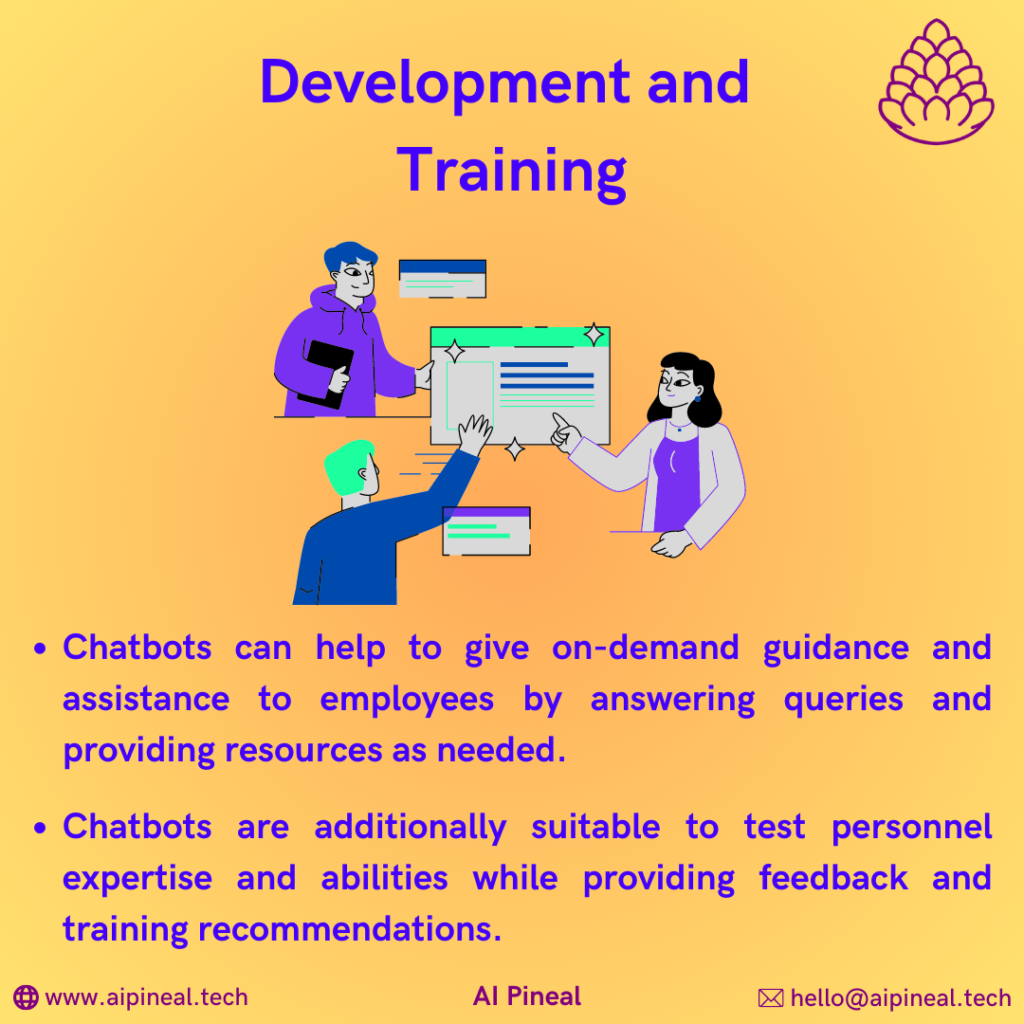
AI chatbots can help with staff training and development. Chatbots can help to give on-demand guidance and assistance to employees by answering queries and providing resources as needed. These can boost employee productivity and satisfaction with work while easing the pressure on instructors and supervisors.
Chatbots are additionally suitable to test personnel expertise and abilities while providing feedback and training recommendations. Businesses may ensure that their staff has the knowledge and necessary proficiency to thrive in their roles by utilizing chatbots in this manner.
Conclusion
In conclusion, AI chatbots have a broad spectrum of corporate uses, spanning client assistance to corporate operations and beyond. Businesses may improve efficiency, improve customer experience, and cut costs by embracing the power of chatbots.
Whether your organization is just starting to use chatbots or wants to extend their usage, there’s no denying that they’ll play an even more significant role in the coming years of business.
Subscribe to our newsletter
